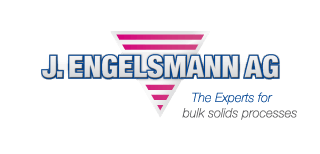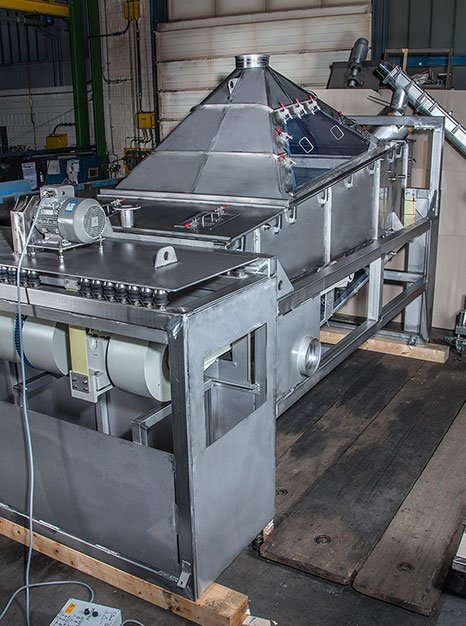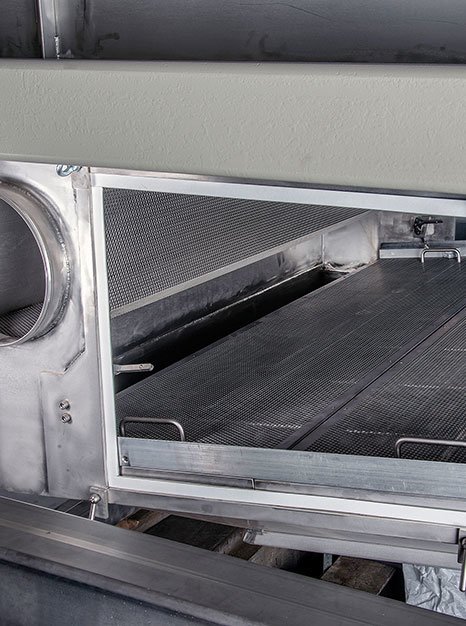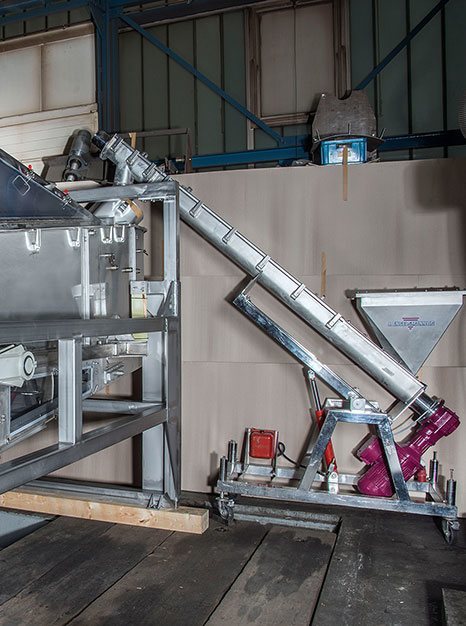- Sectors ›
- Article: Flawless Product Quality when Screening Plastic Granulate: Gentle Screening in Multi-Tasking Mode
27.07.2015
Flawless Product Quality when Screening Plastic Granulate: Gentle Screening in Multi-Tasking Mode
When the demands on the plastic product in use are particularly high, thermoplastic polymers such as polycarbonate (PC) are never far away. Polycarbonate is normally only used where other plastics are too soft, too fragile, scratched too easily or too dimensionally instable. It is supplied to the plastics industry in its primary form as pellets or granulate, where it is then processed to become end products. To be able to guarantee its high quality, the raw material must be manufactured with a flawless quality. Its properties demand the highest standards from the screening technology used, which requires the use of special machine solutions.
Polycarbonate is used as a material for CDs, DVDs, drinking water containers and also as a glass alternative, for example for eyeglass lenses and roof constructions for stadiums, railway stations and conservatories. In comparison to brittle glass, polycarbonate is lighter and considerably more resistant to impacts. In addition, there is no risk of shattering with moderate impact forces and speeds, which makes polycarbonate panes particularly suitable for use in the industrial sector. As well as their high breaking strength, they can be used for a wide temperature range and have a long life span, meaning they are widely used as the safe solution for security glazing and machine covers.
Before polycarbonate can be processed into the end product, it must satisfy the highest quality demands and be in a “flawless” condition. As part of the manufacturing process, any adherent dust particles, agglomerates and overlengths are screened out using a special screening process in order to achieve the desired particle size and product quality. However, the properties of plastics in their primary form make the screening task difficult and place high demands on the machine usage. A current example of use by screening machine manufacturer J. Engelsmann AG documented the complexity when a leading manufacturer of polycarbonate was looking for a high-performance machine solution during the construction of a new production line at one of its production sites in China.
The demands made by the client for the supplied screening machine were diverse and demanding at the same time. A distinct screening of overlengths (extrudates, doubles and triples) with a screening degree of over 98.5% should ensure that the granular product does not contain any impurities at all due to the high quality demands, as only a pure granular structure without overlengths, fibers or adherent dust can be used for further processing. Another challenge was the adaptation of the screening machine to the upstream production process. An upstream strand pelletizer, which breaks up the plastic strands formed in the extruder by splitting them into small granular particles, caused the space available at the installation site to be restricted, meaning the individual conditions had to be allowed for accordingly during the design of the machine.
Drying during the screening procedure optimizes the screening capability of the product
Thanks to extensive experience with complex screening tasks, the team at Engelsmann knew about the problem with screening granular polycarbonate. After in-depth tests with the original product, the Engelsmann design engineers were sure that the use of a Freischwinger type long-stroke screening machine could fulfill the demands by the client. The free-swinging screening model was designed by Engelsmann especially for the screening of dry and free-flowing bulk goods. Due to its high throughput of up to 250 t/h and the particularly gentle screening process with distinct separation of up to 99%, the Freischwinger model is used in all sectors of the chemicals, pharmaceutical, plastic and food industries.
To satisfy the customer demand for screening quality and output capacity, the Freischwinger model was designed with double-deck execution for its use in faraway China, with which the polycarbonate granulate fed into the strand pelletizer is screened from fine to coarse using two screening decks arranged on top of each other. The granulate is fed into the lower screening level through a product returns pan and screened again, so that the lower screening deck acts as a control screen to ensure the necessary screening level. Adapted to the required throughput of 20 t/h and the desired granulate specification (2.5 x 3.0 mm), the upper screening deck is equipped with six screening inserts made of perforated steel plate with a diameter of 4.5 mm per perforation and the lower screening deck has six screening inserts and a perforation diameter of 6 mm, meaning the free-swinging screening machine has a net screening surface of 10.5 square meters. To achieve the best screening capacity of the surface-moistened product through the strand pelletizer, the granulate is continually dried during the screening process and cooled at the same time. As well as the six perforated inserts, two more inserts were installed for this purpose, which provide constant air circulation during the screening process through an air-intake nozzle mounted above the screening trough. This air circulation dries the product, while cooling it from 60°C to 40°C. The air circulation also has the effect that dust is removed from the product in the counter airflow, by carrying any dust particles clinging to the product into a downstream filter unit. The condensate created through the associated drying process is continually removed with the airflow using an extraction funnel in the lid of the machine.
To ensure gentle screening, the long-stroke screening machine including all the parts that come into contact with the product, except for the drive unit, are produced from high-quality stainless steel (V4A 1.4571). In addition, the use of seals and other metals inside the screening trough were avoided and the installed dust removal system in the screen was fitted with silicone balls to avoid any contamination of the granulate caused by material abrasion. To visually monitor the screening process, the machine is fitted with generous Makrolon screens in the lid and on the sides, at the height of the lower screening deck. Thanks to the break-proof protective screens, the granulate distribution and product flow within the screening machine can be monitored.
After the screening procedure, the product, which can be between max. 2.5 and 3.0 mm in diameter and length, is removed from the machine using the fine grain outlet and fed into the downstream filling process. The coarse particles, which cannot be used for further processing, are removed from the machine through a coarse grain outlet designed for this. The inlet and outlet were arranged in accordance with the local conditions, which led to the inlet for product feeding being fitted on the final storage side, not on the drive side as is the case for standard models. The form, contour and inclination of the inlet were also adjusted to the outlet of the strand pelletizer.
Economic machine use with building block principle and oscillating drive
To minimize standstills and achieve the high level of machine availability in the three-shift 360-day per year operation (plus five working days for maintenance and any repairs), it must be possible to clean the machine quickly. Thanks to the modular design of the free-swinging long-stroke screening machine and a quick-change design, the standardized screening inserts, which are locked using pressure plates, can be quickly and easily replaced in just a few moves after the lid is removed. The free access to the screening inserts and their simple disassembly make it easy to ensure the product chamber within the machine is cleaned very quickly without leaving any residue. In addition, inside parts can be accessed and replaced easily. The quick releases create a dust-proof seal between the screening trough and lid parts, preventing dust particles from escaping during the screening process.
For energy-saving operation, the special-edition Freischwinger is equipped with a specially-developed oscillating drive. Driven using an electric motor, which passes its energy to a centrifugal mass equipped with driving plates using a V-belt, this is tailored exactly to the dimensions of the screening trough. The drive section (shaft and flywheel) weigh about the same as the trough including the product. An electric motor drives the mass with full nominal flow rate for approx. 15 seconds and then is kept in momentum with just 10-20 percent of the nominal current. In this way, the electrical energy is converted into rotational energy, saved in the flywheels and gradually released. Thanks to the drive, which is based on the counterbalance weight, the machine only needs a small amount of energy (7.5 kW with 20 t/h throughput rate). In comparison to screening machines with oil-lubricated motor drive, the oscillating drive only subject to slight wear-and-tear, which in turn results in low material use and maintenance costs. Another advantage of the oscillating drive is the low-noise operation with less than 79 dB, in view of the machine size and in comparison with conventional screening machine brands.
The screening machine, designed in accordance with the authenticated test body in China (NEPSI), was able to be shipped to the Far East after three months of research and development, where it is being fitted and commissioned on-site by two Engelsmann service technicians.









